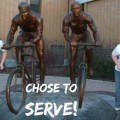When I was in my early twenties, I developed partial amnesia. I discovered I had lost the stories of my life that happened between ages three and ten. I was surprised to discover how much that loss impacted my life. Those were very formative years and I had no idea what had happened to me during that time. It was when I learned to read, started school, lived next door to my grandmother…so much happened and it was gone.
Family filled in some of the gaps, but I knew there was more. What was important to a little girl was not necessarily memorable to an adult and what mattered to me didn’t necessarily matter to anyone else. Of course, there were also events that no one but me knew about. Despite being a writer, I had neglected to get those stories on paper, and I hadn’t started journaling until I was in eighth grade.
I had been told the memories might return with the help of prompts. I was fortunate. Some stories have returned over the years, even as recently as last year. As they return, I race to get them onto paper so I won’t lose them again. Each time a story returns, I wonder how I lived so long without it.
We often think of writing our personal history as something we do for others, but it is also something we do for ourselves. Our ancestors will want to know who we were beyond the statistics, but we also need to know who we are. The stories that stay in our hearts are the ones that defined us. They made us who we are, shaped our character and the way we see our lives. Our stories matter.
Get your stories out of your head and onto paper. It can seem overwhelming to put a lifetime of memories somewhere, but it doesn’t have to be hard. Set aside an hour every Sunday to record one memory. During the week, jot down any ideas that come to you. If you are consistent, your mind will generate ideas every Sunday because it knows it needs to.
You don’t have to write your story in order. Once I figured that out, it became so much easier to write. What daunted me was starting out with “I was born….” This was particularly hard because of the long gap of lost memories. What I did instead was to make a list of every house I ever lived in. I made them bold headings on my computer file. I’ve discovered I seem to divide my life into houses. “Do you remember when we lived in…” We move a lot, so there are a lot of houses.
When it’s time to write, I choose any memory I want. The story I am remembering just now came to mind because it is relevant to something going on in my life or simply something I’m interested in right now. I feel the story more passionately, so I write it better—and it’s more fun to write. I simply insert the story into the correct house section and put it wherever it fits into the chronology if I can remember. I don’t think it matters much if I get events out of order. I just organize them the best I can. Thanks to computers, if I realize I was wrong, the story is easily moved.
Back up your stories onto multiple computers or hard drives. Print them out from time to time. Technology changes and someone may find your old CD in 120 years and have no way to play it. Paper never gets outdated. Put the stories into a binder and label them so your descendants will know right away they’ve just found a treasure in the attic.
Your ordinary, everyday experiences will be novel to your descendants. Think of how simple the stories in the Little House on the Prairie books are. To Laura, they were ordinary, everyday events. To us, they are unusual.
My history contains the following:
“There was a large front and back yard with lots of trees. There was a front porch and in the evenings during summer everyone on the street would come out to sit on their porches or to walk along the block, socializing. The children would ride bikes or roller skate. Sometimes I did those things, but just as often I curled up in a corner of the porch or under a tree to read.”
When I first wrote it, I thought, “Everyone did that. No one will be interested.” Then I realized my own children don’t have that type of memory. The days of spending hot summer nights on the front porch or strolling the street and socializing are gone. Now everyone is inside with the air conditioner and television or computer. I kept it in as a story that might appeal to future generations.
Write your story. Put in it all the little, unimportant things that have happened to you, your hobbies, your dreams, your opinions. It will all help to turn you into a real person to your great-great-grandchildren—and may just preserve your memories for yourself as well.
The late Terrie Lynn Bittner—beloved wife, mother, grandmother, and friend—was the author of two homeschooling books and numerous articles, including several that appeared in Latter-day Saint magazines. She became a member of the Church at the age of 17 and began sharing her faith online in 1992.





